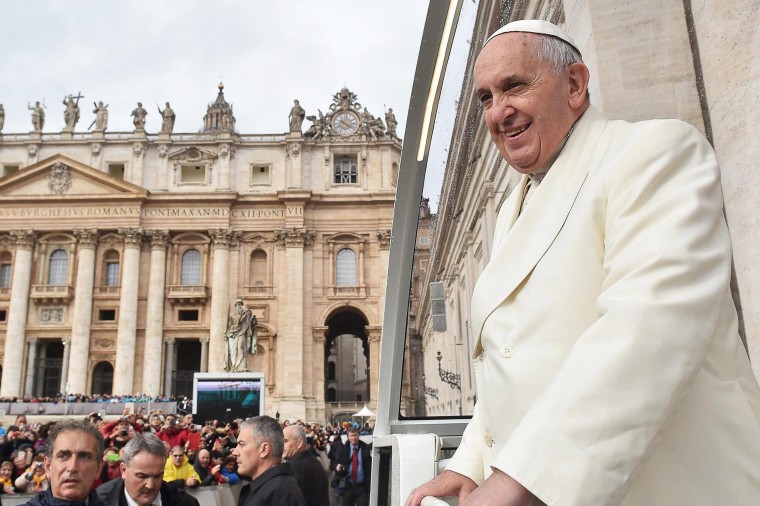Late last year, Pope Francis
said he intended to invest considerable energy in 2015 urging Catholics around the globe to help combat climate change. He wasn't kidding.
The pope, joined by U.N. Secretary-General Ban Ki-moon,
hosted a summit on the issue yesterday, and the name of the gathering was itself intended to get attention: "Protect the Earth, Dignify Humanity: The Moral Dimensions of Climate Change and Sustainable Development." The event organized panels on relevant "scientific, moral and economic issues" surrounding global warming.
All of this is designed to coincide with ongoing international talks, but also the summer release of Francis' encyclical on the climate crisis. The
New York Times reported yesterday that the pope's activism is "alarming some conservatives in the United States who are loath to see the Catholic Church reposition itself as a mighty voice in a cause they do not believe in."
In the United States, the encyclical will be accompanied by a 12-week campaign, now being prepared with the participation of some Catholic bishops, to raise the issue of climate change and environmental stewardship in sermons, homilies, news media interviews and letters to newspaper editors, said Dan Misleh, executive director of the Catholic Climate Covenant in Washington. But the effort is already angering a number of American conservatives, among them members of the Heartland Institute, a libertarian group partly funded by the Charles G. Koch Foundation, run by the billionaire industrialist Koch brothers, who oppose climate policy.
While Koch-financed operations usually aren't shy about taking the offensive against perceived opponents, the far-right Heartland Institute seems to realize attacking the pope is a little more complicated.
In a statement, the group's president said he fears the "Holy Father is being misled," despite Francis' heart being "in the right place."
Yes, the politics of climate denial are getting a little tricky. In a few months, this will get a little more complicated.
In September, at the invitation of House Speaker John Boehner (R-Ohio), the pope will deliver an address to a joint session of Congress. How likely is it that Francis will address the climate crisis Boehner and his caucus choose to ignore? The odds are about 100%.
"I think Boehner was out of his mind to invite the pope to speak to Congress," the Rev. Thomas Reese, an analyst at the National Catholic Reporter, told the Times. "Can you imagine what the Republicans will do when he says, 'You've got to do something about global warming'?"
As for the Koch-backed groups and others in the oil industry, Rebecca Leber
explained this week that their goal, at least for now, is trying to argue that they, and not the pope, are truly committed to helping the world's downtrodden.
"The world's poor will suffer horribly if reliable energy -- the engine of prosperity and a better life -- is made more expensive and less reliable by the decree of global planners," Heartland Institute President Joe Bast wrote in a press release. The American Petroleum Institute (API), the oil industry's lobby arm, reprised a similar theme, telling The Guardian, "fossil fuels are a vital tool for lifting people out of poverty around the world, which is something we're committed to." In other words, an industry driven by profit above all is attempting to rebrand itself as a champion for the poor.
Watch this space.
